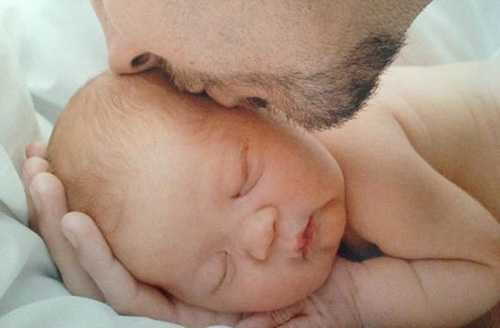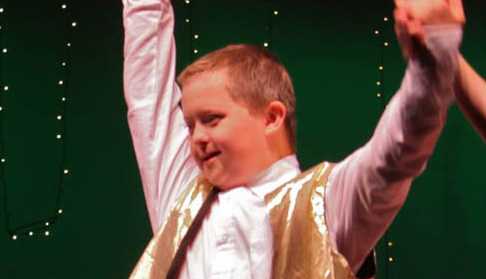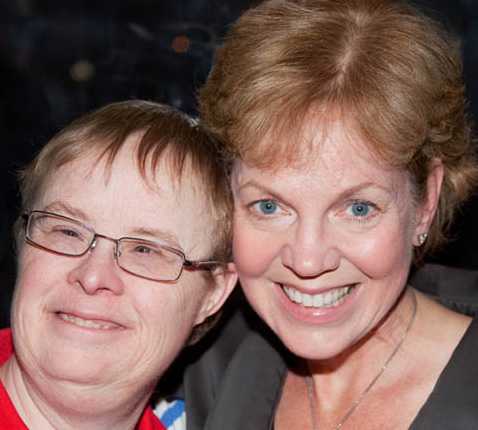Stories: Living with Down Syndrome
Down syndrome is a condition in which a person has an extra chromosome 21. This extra chromosome changes how a baby’s body and brain develop. To learn what it’s like to live with this condition or how families are affected, read these real stories from people living with Down syndrome.

Caleb’s Story
Stacy’s son, Caleb, was born with Down syndrome. She shares how having a child with disabilities gives her family a new cup by which to measure. Read her family’s story below.
There are many different emotions a mother and father go through when their child is born with a disability, but the emotion that most often gets stymied in the midst of tests and uncertainties is the simple beautiful joy of having a baby. Our son Caleb was born with Down syndrome a few months ago, and I did not wish to hide or ignore the diagnosis, but I found it difficult to celebrate as countless tests and pending results kept knocking at the door. Each time I looked at my baby boy, all I could see was a marvelous creation. He was not like any other baby—he was uniquely himself and he was altogether mine. Having a child with disabilities gives you a new cup by which to measure; a simple smile is no longer simple, it is a triumph and a glorious sight, and a common milestone on the doctor’s chart becomes the very corner stone of great hopes. We do not know how far our children will go, but we do know the depth of our love. I cherish my little boy each day and don’t waste the present worrying about the future.

Bryton and Fenix’s Story—Written by their mom, Janalyn
Janalyn shares her family’s story of both of her sons: Fenix who was born with Down syndrome, and Bryton who was born with birth defects of his eyes. Although Janalyn’s family has faced many challenges, they have faced each challenge head on, not willing to give up or be knocked down. Read their inspiring story:
I am a proud mother of four beautiful children: two boys and two girls. Both of my sons were born with birth defects. Fenix, the older of the two boys, has Down syndrome.
Things were rough when we first found out. My husband and I had little to no experience with Down syndrome. He was hospitalized multiple times as a baby because of respiratory illnesses. He is a very energetic child who loves sports and music. He loves life. His future is very bright.
My youngest child, Bryton, was born with anophthalmia (missing eye) on his left side and micropthalmia (small eye) on his right side. Because of this, he is completely blind. Once again, our family was in a state of disbelief. Once the shock wore off and we were able to get Bryton the medical care and help he needed to succeed, we were able to come together as a family once again. Bryton gives the greatest hugs and is always happy. We still have some challenges. His speech is delayed and he is just learning to walk. His laugh could brighten anyone’s day. We face many challenges as a family, but we face each challenge head on, not willing to give up or be knocked down. All my children deserve the best that life can give and that is what I am here for—to ensure that their lives are grand.

Keaton’s Story—Written by his mom, Paula
Keaton was born with Down syndrome. His mom, Paula, shares her perspective of raising a son with Down syndrome. She describes how Keaton is happiest when he is making someone else happy by helping or serving. Read more of his inspirational story below.
My husband and I were both 40 years old with three beautiful daughters who were quickly becoming teenagers. Something possessed us to think that if we had another child, our nest would not be empty as soon and therefore we would not be “old.” So we did just that, well, the having the child part.
After 36 REALLY long hours we delivered our son at home with the help of midwives. My main concern was that his feet were turned in, but my husband was concerned that he looked like he may have Down syndrome. The midwives along with a family physician who was a member of our church assured us that we didn’t have anything to be concerned about, because he had good muscle tone, a strong cry, and did not have the single crease across the palm of his hands, which most babies with Down syndrome do. They pointed out that he did not look like “a typical Down syndrome baby.”
After seven long months of denial, we submitted to a blood test, and it confirmed that our handsome little boy indeed had Trisomy 21. We were blessed with an amazing geneticist who encouraged me to raise my son in the same way I had his three older sisters, to expect great things. I remember asking “what do you think of my son?” and his reply was “he is a great little guy.” I countered with “no, I mean, what will he be able to do?” His reply to that was “he is the only one who will be able to show you that, he will be able to do anything any other kid can do, it will just take him a little longer.”
Keaton required surgery to repair club feet and open heart surgery to repair a congenital heart defect, all before he was two years old. I can remember wondering at times if he would ever walk or talk. He now keeps us all entertained with his dancing and singing. He sings the Star Spangled Banner every year for his school musical and anytime he receives an invitation, whether for a school board meeting or a high school volleyball game. He will tell you he is a “rock star.” He is happiest when he is making someone else happy by helping or serving.
Each phase of Keaton’s life has brought new challenges, and God has given us the wisdom to get through each one. As we ease in to the teen years, it brings a brand new bag of questions and forces this mom to think once again about how I will survive an empty nest. I have to tell myself we have made it this far, God will get us through the rest.

Mark’s Story—Written by his sister, Sonja
Mark is an adult living with Down syndrome. He lives a happy and worthwhile life, proud of his work and secure in the love of his family and friends. His sister shares more of his inspiring story below.
Employed, living independently, an active member of his community — it would have been hard to imagine that these words would ever describe my brother Mark when he was born with Down syndrome in 1960. The doctor’s advice at the time was typical of the era. “Institutionalize him,” he said. “It’s best for your family.” My parents ignored that advice, took Mark home — and found a new doctor.
Our family is justifiably proud of all that Mark has accomplished since then, often confounding the experts of the day. Our small town in Minnesota didn’t have any educational opportunities to offer Mark, so initially he was transported to a distant town for school. Over time, our local school system was able to accommodate him. At first only segregated classes for the “mentally retarded” (a term now considered to be offensive) were offered – and kids were divided into classes based on whether they were labeled as “educable” or “trainable” (also now obsolete terms). But by the time Mark reached high school, he was included in some regular classes and participated in extracurricular activities, even serving as manager for the wrestling team – something that was practically unheard of at the time for a student with an intellectual disability. After high school, Mark moved into a brand new group home in our town. Three years later, he moved into his own apartment. He’s been living independently ever since, and working steadily at a local fast-food restaurant.
Mark has enriched my life in countless ways, including guiding my career path. When I was in high school, I was alarmed when my biology teacher said the average survival for persons with Down syndrome was 16 years (Mark was 14 at the time). My first goal was to become a genetic counselor; then I went back for training to become a pediatrician and clinical geneticist. After joining the Birth Defects Branch at CDC, one of my first projects was to examine survival among persons with Down syndrome — our study, published in Lancet in 2002, showed that survival was 49 years in 1997 (as estimated by median age of death from US death certificates).
While I’m delighted with Mark’s many personal triumphs, I’m also aware that there are lots of challenges ahead. I know, for example, that a significant proportion of people with Down syndrome develop Alzheimer’s disease. Thankfully, Mark doesn’t show any signs of it, but we monitor him closely – a task that might be easier if there were more health care providers in rural Minnesota knowledgeable about adults with Down syndrome. And Mark’s work situation always feels a little bit shaky. Even though he’s been a loyal employee for many years, he’s often the first to have his hours cut when college students come home for the summer or when the economy struggles. It’s not easy.
Yet Mark takes all this in stride. He leads a happy and worthwhile life, proud of his work and secure in the love of his family and friends. Every day, he tries to do his best in everything he does – which, of course, inspires everyone around him to try to do the same. Mark’s quite a guy — I’m lucky to be his sister!
- Page last reviewed: May 16, 2017
- Page last updated: May 16, 2017
- Content source:



 ShareCompartir
ShareCompartir